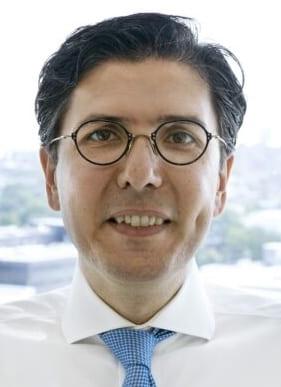Q&A: Long-Term Cardiovascular Risk of COVID-19, with Ziyad Al-Aly, MD
Lead investigator of a recent study assessing risk of long-term COVID-19 risk using data from more than 11 million patients, Ziyad Al-Aly, MD, sits down with Practical Cardiology for a Q&A on the findings from his research.
Ziyad Al-Aly, MD

A recent study with data from more than 11 million patients is providing clinicians with an overview of the long-term risk of cardiovascular disease and adverse cardiovascular events associated with COVID-19. A study comparing patients with COVID-19 against contemporary and historic controls, results demonstrate COVID-19 was associated with increased long-term risk of negative cardiovascular outcomes, even among patients with more mild forms of COVID-19.
Led by Ziyad Al-Aly, MD, Director of the Clinical Epidemiology Center, and the Chief of Research and Education Service at Veterans Affairs St. Louis Health Care System, the study used data from Veterans Affairs databases to compare a cohort of 153,760 patients with COVID-19 against a cohort of 5,637,647 contemporary controls in the Veterans Health Administration system with no evidence of SARS-CoV-2 infection and a historical cohort predating COVID-19 containing 5,859,411 individuals from 2017. The primary outcome of interest for the study was the 12-month burden of respecified cardiovascular outcomes according to care setting of the acute infection.
In their study, investigators found individuals with COVID-19 were act an increased risk of multiple forms of cardiovascular disease, including risk of cerebrovascular disorders, dysrhythmias, ischemic and non-ischemic heart disease, pericarditis, myocarditis, heart failure, and thromboembolism, beyond the first 30 days following infection.
With an interest in learning more about the study, Practical Cardiology reached out to Al-Aly for more perspective on the design and findings of his investigation into long-term cardiovascular outcomes in COVID-19. An edited transcript of that conversation can be found below and the full conversation is available on MedicalWorldNews.com.
Q&A on Long-Term Cardiovascular Sequelae of COVID-19
Practical Cardiology: Can you describe the design and findings of your study?
Ziyad Al-Aly, MD: We knew from an early phase of the pandemic that some people with COVID-19 need to be hospitalized and then needed to be in the ICU. Soon, we learned that some of these people are having heart problems, but we didn't know what happened afterwards or what really happens in the long term—whether there are also long-term ramifications or long-term consequences on the heart and whether this was present in people who had mild disease and did not need to be hospitalized.
What we did was assemble a cohort of 154,000 people and then compared them to 2 control groups. One control group called the contemporary control group, which included it about 5,000,000 million people, and another control group, called the historical control group, of people who lived prepandemic and were not exposed to COVID-19, which included about 5.5 million people. Altogether, we included data from more than 11 million people and we followed them for a year.
The intent of the analysis was to try to understand what happens to people's hearts when they get to COVID-19. What happens to them a year after? Do they still have heart problems? Are they having heart attacks, blood clots, or arrhythmias? What happens to people's heart a year out.
What we found was that people with COVID-19 a year after the initial infection were at increased risk of all sorts of heart problems, including strokes and TIA, atrial fibrillation, tachycardia, bradycardia, acute myocardial infarction, heart failure, myocarditis, pericarditis, deep vein thrombosis, and pulmonary embolism. Across the board, there is a really increased risk of all these manifestations in people with COVID-19 compared to both control groups.
PC: What surprised you most about the data?
ZA: I think the major revelation here was that the risk really persisted a year out. I think the major revelation here is really that the risk of heart problems persisted a year after the initial infection, meaning that we're now starting to think about SARS-CoV-2 as a virus that might actually have chronic consequences that last well beyond the acute phase. Then, the second thing that was eye-opening was that we went into it thinking that this risk is most likely going to be concentrated in people who had risk factors to start with, such as those with obesity, those who had smoked a lot, or those with a history of cardiovascular disease, but what we saw is that even in these people who were previously healthy, they were still exhibiting or displaying risk of heart problems a year out. The risk was evident.
So, in that sense, there was a bit of a surprise and the other thing was when we did our subgroup analyses by care setting, I also expected that people who had been hospitalized in ICU with would manifest with risk, but not necessarily in people who maybe were asymptomatic or have very mild disease that does not need to be in the hospital at all, but the risk was evident even in those people. So, that was really a bit of a surprise that the risk was evident, even among people who are not hospitalized for the disease.
PC: Do any of your findings pose a more immediate threat to mortality or quality of life than others?
ZA: I think some of the manifestations that we are describing here, including, strokes, heart failure, and the more chronic conditions, are certainly manageable. So, we don't want to leave people with the impression that this is sort of a total catastrophe, because it's not. A lot of these complications that we describe when looking at cardiovascular sequela are actually chronic consequences that are manageable, but not totally or fully reversible.
I think that's really what concerns us. With COVID-19, we, initially, thought that it was only a respiratory illness. It's very, very clear now, that, in some people, but not everybody, it's going to leave marks on them and result in long-term cardiovascular events.